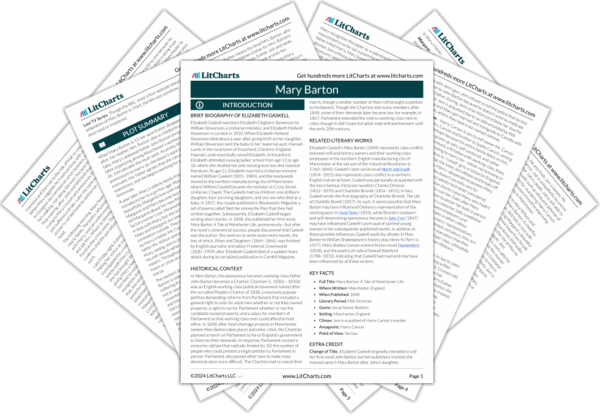John Barton Quotes in Mary Barton
“Not but what beauty is a sad snare. Here was Esther so puffed up that there was no holding her in.”
“I tell you it’s the poor, and the poor only, as does such things for the poor. Don’t think to come over me with th’ old tale that the rich know nothing of the trials of the poor; I say, if they don’t know, they ought to know.”
So with this consciousness she had early determined that her beauty should make her a lady; the rank she coveted the more for her father’s abuse; the rank at which she firmly believed her lost Aunt Esther had arrived.
“Don ye think He’s the masters’ Father, too? I’d be loth to have ‘em for brothers.”
“Eh, John! donna talk so; sure there’s many and many a master as good or better nor us.”
“If you think so, tell me this. How comes it they’re rich, and we’re poor? I’d like to know that. Han they done as they’d be done by for us?”
“How can I keep her from being such a one as I am; such a wretched, loathsome creature! She was listening just as I listened, and loving just as I loved, and the end will be just like my end. How shall I save her?”
To whom shall the outcast prostitute tell her tale? Who will give her help in the day of need? Hers is a leper sin, and all stand aloof dreading to be counted unclean.
A number of pieces of paper (from the identical letter on which the caricature had been drawn that very morning) were torn up, and one was marked.
The corner of stiff, shining, thick, writing paper she recognised as a part of the sheet on which she had copied Samuel Bamford’s beautiful lines so many months ago—copied (as you perhaps remember) on the blank part of a valentine sent to her by Jem Wilson, in those days when she did not treasure and hoard up everything he had touched, as she would do now.
The eyes of John Barton grew dim with tears. Rich and poor, masters and men, were then brothers in the deep suffering of the heart; for was not this the very anguish he had felt for little Tom, in years so long gone by that they seemed like another life!
“Let my trespasses be unforgiven, so that I may have vengeance for my son’s murder.”
“You say our talk has done no good. I say it has. I see the view you take of things from the place where you stand.”

John Barton Quotes in Mary Barton
“Not but what beauty is a sad snare. Here was Esther so puffed up that there was no holding her in.”
“I tell you it’s the poor, and the poor only, as does such things for the poor. Don’t think to come over me with th’ old tale that the rich know nothing of the trials of the poor; I say, if they don’t know, they ought to know.”
So with this consciousness she had early determined that her beauty should make her a lady; the rank she coveted the more for her father’s abuse; the rank at which she firmly believed her lost Aunt Esther had arrived.
“Don ye think He’s the masters’ Father, too? I’d be loth to have ‘em for brothers.”
“Eh, John! donna talk so; sure there’s many and many a master as good or better nor us.”
“If you think so, tell me this. How comes it they’re rich, and we’re poor? I’d like to know that. Han they done as they’d be done by for us?”
“How can I keep her from being such a one as I am; such a wretched, loathsome creature! She was listening just as I listened, and loving just as I loved, and the end will be just like my end. How shall I save her?”
To whom shall the outcast prostitute tell her tale? Who will give her help in the day of need? Hers is a leper sin, and all stand aloof dreading to be counted unclean.
A number of pieces of paper (from the identical letter on which the caricature had been drawn that very morning) were torn up, and one was marked.
The corner of stiff, shining, thick, writing paper she recognised as a part of the sheet on which she had copied Samuel Bamford’s beautiful lines so many months ago—copied (as you perhaps remember) on the blank part of a valentine sent to her by Jem Wilson, in those days when she did not treasure and hoard up everything he had touched, as she would do now.
The eyes of John Barton grew dim with tears. Rich and poor, masters and men, were then brothers in the deep suffering of the heart; for was not this the very anguish he had felt for little Tom, in years so long gone by that they seemed like another life!
“Let my trespasses be unforgiven, so that I may have vengeance for my son’s murder.”
“You say our talk has done no good. I say it has. I see the view you take of things from the place where you stand.”











